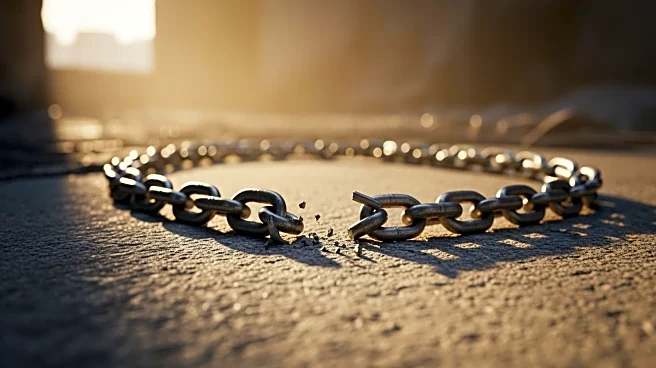What's Happening?
The future of Gaza is at the center of a strategic rivalry between Gulf powers, particularly Qatar, Saudi Arabia, and the United Arab Emirates (UAE). Reconstruction and demilitarization are key issues,
with Israel hoping Saudi Arabia and the UAE will lead Gaza's rebuilding efforts. However, both countries have stipulated that their involvement is conditional upon Hamas being stripped of its weapons and a new governing framework replacing its rule. A long-term ceasefire and gradual Israeli withdrawal are also prerequisites. Saudi Arabia and the UAE view Hamas as a destabilizing extremist force that undermines broader Palestinian interests, and their demand for disarmament is framed as a domestic political move to justify aid to their citizens. Qatar, meanwhile, remains a primary sponsor and mediator for Hamas, balancing its loyalty to the U.S. with its desire to be seen as a champion of the Palestinian cause.
Why It's Important?
The demand for Hamas's disarmament by Saudi Arabia and the UAE is significant as it ties economic and security cooperation to the removal of Hamas's weapons. This stance reflects broader regional goals, including enhancing security and economic interests and maintaining public support at home. The involvement of these Gulf states in Gaza's reconstruction could reshape the Palestinian arena and shift the balance of power in the region. However, Qatar's approach, which favors rapid reconstruction with fewer conditions, could restore direct funding to Hamas and deepen Doha's influence. The differing positions of these Gulf states highlight the complexities of regional politics and the challenges in achieving a unified approach to Gaza's future.
What's Next?
The future steps involve potential participation of the UAE in a multinational security force in Gaza, contingent upon a disarmed framework and reforms within the Palestinian Authority. Saudi Arabia and the UAE's absence from the Sharm el-Sheikh summit reflects dissatisfaction with the U.S.-led framework and Qatar's prominent role. The Gulf states remain cautious about a multinational force due to concerns about open conflict with Hamas and ambiguity about the mission's mandate. The broader goals of enhancing regional standing and advancing security and economic interests remain, but the ambitious plan's implementation is uncertain due to financial commitments elsewhere and no clear political horizon.
Beyond the Headlines
The strategic rivalry over Gaza's future involves deeper implications, such as the potential for reshaping regional alliances and influencing the balance of power in the Middle East. The involvement of Gulf states in Gaza's reconstruction could lead to long-term shifts in regional dynamics, affecting diplomatic relations and economic investments. The ethical and cultural dimensions of disarmament and reconstruction efforts also play a role, as they impact the lives of Palestinians and the broader Arab world. The differing motivations and conditions set by Gulf states highlight the complexity of achieving a sustainable peace and stability in the region.











